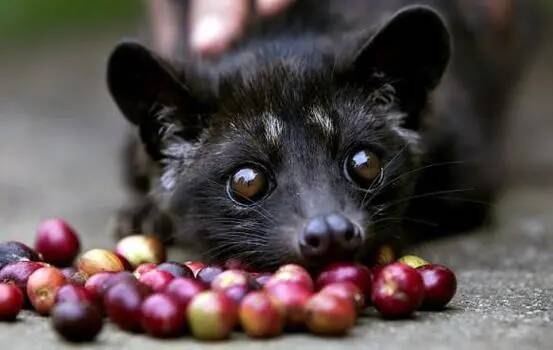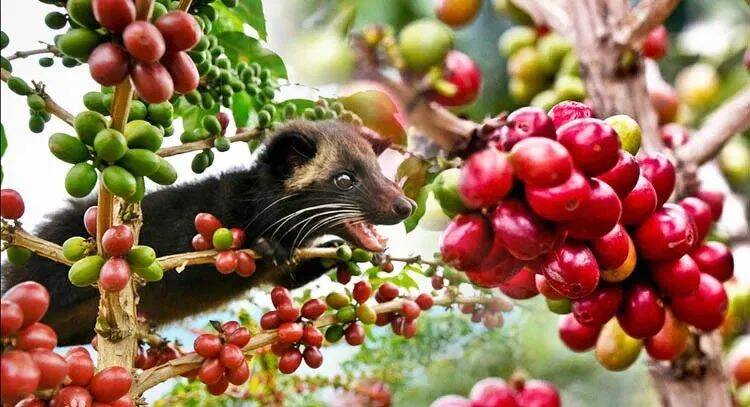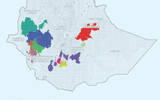"Cat Poop Coffee", is it really cat Poop?
I believe everyone has heard of the Kopi Luwak Initiative, and this coffee, which sounds very heavy, can be sold at a price comparable to the red mark! Can not help but let people have a strong interest in its experience. So, today we are going to talk about the "Kopi Luwak", which is known as the gold in the coffee world. Where is it expensive?

Note: please rest assured that you do not need to find a reasonable time and place to read this article. Although, the taste does not sound too light, but it does not matter, we expected the picture did not appear (probably), so be bold and rest assured to turn down!
Is Kopi Luwak really cat shit? To be exact, yes, but no! Because it is indeed a product made from cat droppings, but the cat here refers to the civet growing in the tropical rainforest, not the pet cat spoiled in the city, so please shovel shit officials to stop your claws on your own cats!

Musk cat (also known as civet cat, fragrant cat, nine-section civet) is a unique omnivorous wild animal in Indonesia, eating everything, including coffee fruit! They will eat the whole coffee fruit, digest the peel and pulp in the stomach, and then excrete the dense, indigestible coffee beans. And these droppings, yes, are the raw materials of the Kopi Luwak Initiative.
The birth of Kopi Luwak in the 17th century, the Dutch discovered a huge business opportunity for coffee, so they immediately left for Indonesia to start growing coffee. And their first stop was Java, Indonesia. As the climate of Java is very suitable for the growth of coffee plants, many years later, the Dutch made a lot of money from the bumper harvest of coffee fruit. As soon as the Dutch tasted the sweetness, the cultivation of coffee began to spread from Java to other islands.
On the other hand, it is Indonesian workers who are in charge of coffee cultivation, and they operate the local coffee cultivation and processing, but too much contact will inevitably arouse curiosity that you want to experience. So Indonesian workers want to taste what their own coffee tastes like. However, these coffees are important commodities destined for Europe, so the Dutch strictly forbid them to pick and drink them privately. Although the Dutch can ban Indonesian workers from picking coffee beans, there is no way to stop wild animals that cannot talk to each other. The ripe coffee fruit attracts a large number of wild civets nearby, which will climb the tree and pick and eat the ripe red fruit, leaving behind the green fruit that is not yet ripe, which makes the Dutch very angry. As a result, the work of Indonesian workers has increased! In addition to being responsible for the cultivation of coffee, but also responsible for driving away these wild civets!
Then, an Indonesian laborer tracked the civet and found several pieces of wild dung mixed with raw coffee beans near the root of the tree. He suppressed the impulse to try coffee for many years, and made him hold out his hand to these "objects" mixed with coffee beans. He took the feces home and washed them! Take out the coffee beans adulterated inside, immediately copy the pot, stir-fry and grind the coffee beans, and pour out the world's first "specially" treated coffee. The experience was not bad, so Indonesian workers spread the news of Kopi Luwak locally. Then, with the continuous spread, Kopi Luwak spread from Indonesia to other countries! At first, people took a lively attitude towards this heavy-tasting product, but with more and more reports around, Kopi Luwak quickly became popular! People have completely changed their attitudes and are scrambling to taste the delicacy of Kopi Luwak.
But the output is too small! A kilo (500g) of wild musk cat shit can produce only 150g Kopi Luwak raw beans, and the loss after baking makes the already scarce beans even rarer. Scarcity is precious, the price of Kopi Luwak is rising all the way, and at its peak it is several times higher than the jade red standard, so it has given rise to the artificial captivity behavior of people shouting and fighting on the Internet! Ka farmers capture and keep civets in captivity, and only feed coffee fruit for mass production for three meals a day! But civets are timid by nature and do not belong to social animals, so keeping them in cages can easily lead to territorial fights, fights, injuries, then infection, and then mutual infection, which is why online people call for a boycott of Kopi Luwak!
What does Kopi Luwak taste like? By the time Kopi Luwak was discovered, Indonesia had already been baptized by leaf rust, so the Arabica species had been replaced by the Robusta species a long time ago. As a result, Kopi Luwak was first discovered as a Robusta species.
Then, the raw coffee beans are eroded by the gastric juice in the civet's stomach for a period of time, and the protein in the beans is broken down, producing more free amino acids, making the whole cup of coffee more mellow to drink! But you should know that this is already a kind of heavy fermentation treatment, not to mention whether Robusta is suitable for shallow baking, just take the taste of this heavy fermentation, if you use shallow baking, I believe you can imagine.
Therefore, Kopi Luwak generally uses deep baking! Deep-baked Kopi Luwak has a spice and chocolate flavor that resembles Manning, but its mellow thickness will be higher. Emmmm, so, to borrow a sentence from a well-known up host of bilibili: some coffee can only exist in the story, not necessarily something you have to spend money to try, which is good for everyone and animals. In addition to Kopi Luwak, there are many other "animal fermentation" of processed coffee. For example, bird shit coffee in Brazil, elephant shit coffee in Thailand and so on.
-END-
Front Street Cafe
No. 10 Baoqian street, Yandun road, Dongshankou, Yuexiu district, Guangzhou, Guangdong province
Important Notice :
前街咖啡 FrontStreet Coffee has moved to new addredd:
FrontStreet Coffee Address: 315,Donghua East Road,GuangZhou
Tel:020 38364473
- Prev

What are the characteristics of the Guji production area in Ethiopia? What kind of coffee beans are Huakui?
When it comes to African coffee, everyone will think of Ethiopia, because Ethiopian coffee has a very high reputation in the global coffee market. It is recognized as the birthplace of coffee and the world's largest coffee gene bank. There are many coffee varieties. According to estimates, Ethiopia currently has about 15000 coffee varieties.
- Next

The correct way to brew hanging ear coffee! How many times can I make hanging coffee? How many milliliters of hanging coffee do you usually make?
Question: What is the end of hand-brewed coffee? That's right! Just hanging ears! (I'm just saying that) When people get tired of the cumbersome and complex brewing process, they want to simplify things. Hanging ears is the best substitute for hand-brewed coffee! It is simple to operate and easy to carry, which is simply too suitable. Although the production of hanging ear coffee is very
Related
- What grade does Jamaica Blue Mountain No. 1 coffee belong to and how to drink it better? What is the highest grade of Blue Mountain coffee for coffee aristocrats?
- What are the flavor characteristics of the world-famous coffee Blue Mountain No. 1 Golden Mantelin? What are the characteristics of deep-roasted bitter coffee?
- Can I make coffee a second time in an Italian hand-brewed mocha pot? Why can't coffee be brewed several times like tea leaves?
- Hand-brewed coffee flows with a knife and a tornado. How to brew it? What is the proportion of grinding water and water temperature divided into?
- What is the difference between Indonesian Sumatra Mantinin coffee and gold Mantinin? How to distinguish between real and fake golden Mantelin coffee?
- What does bypass mean in coffee? Why can hand-brewed coffee and water make it better?
- Unexpected! Ruixing Telunsu lattes use a smoothie machine to foam milk?!
- % Arabia's first store in Henan opens into the village?! Netizen: Thought it was P's
- Does an authentic standard mocha coffee recipe use chocolate sauce or powder? Mocha Latte/Dirty Coffee/Salty Mocha Coffee Recipe Share!
- What is the difference between Vietnam egg coffee and Norway egg coffee? Hand-brewed single product coffee filter paper filter cloth filter flat solution!

